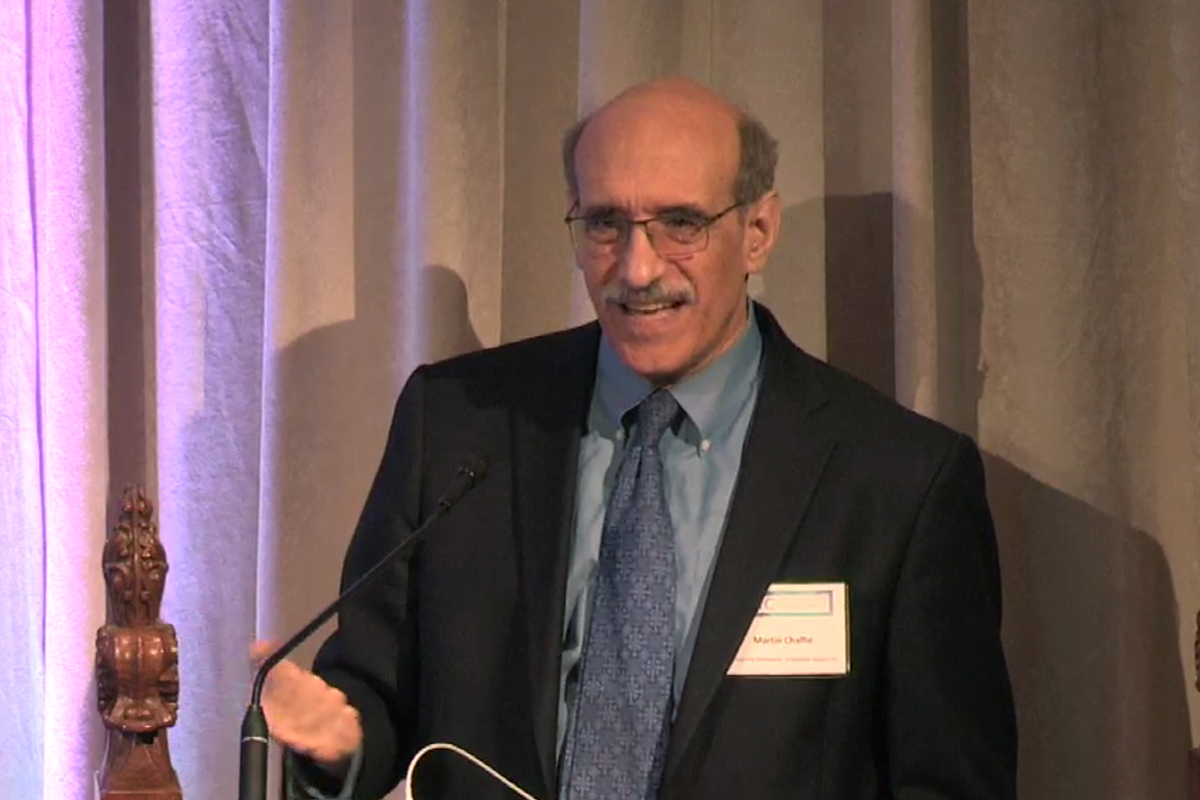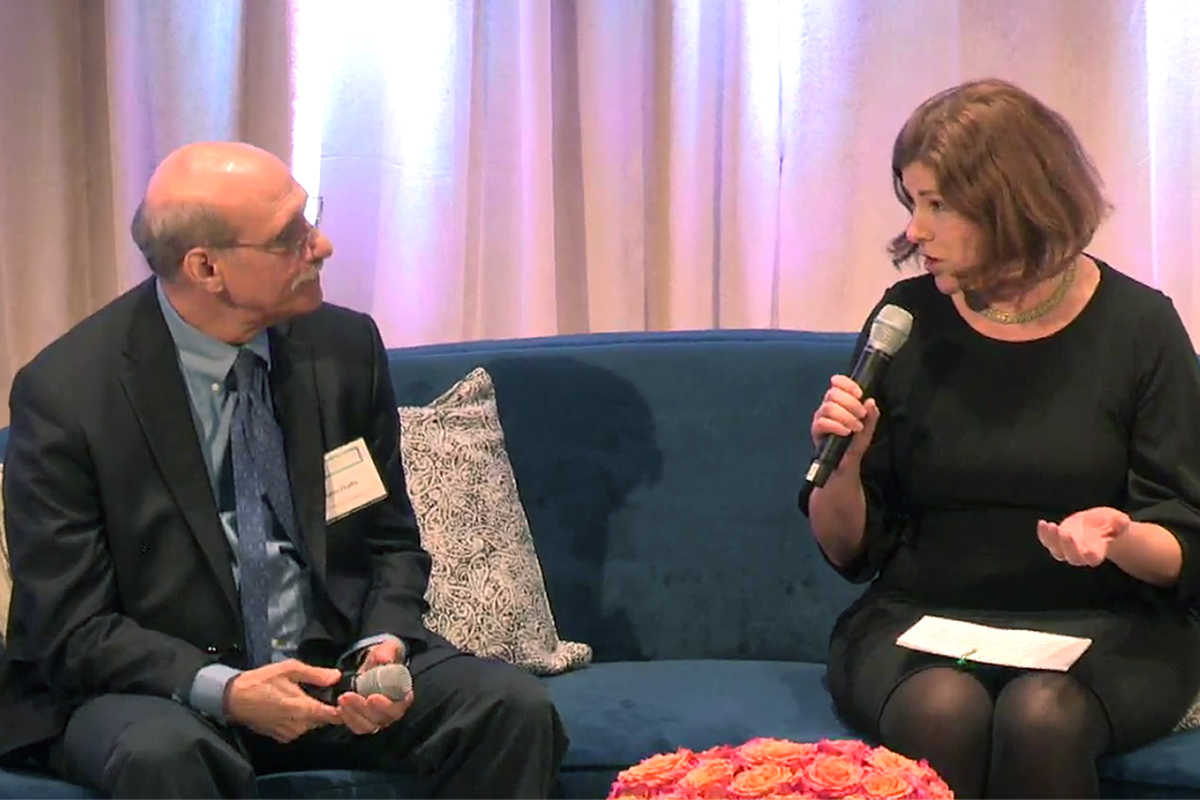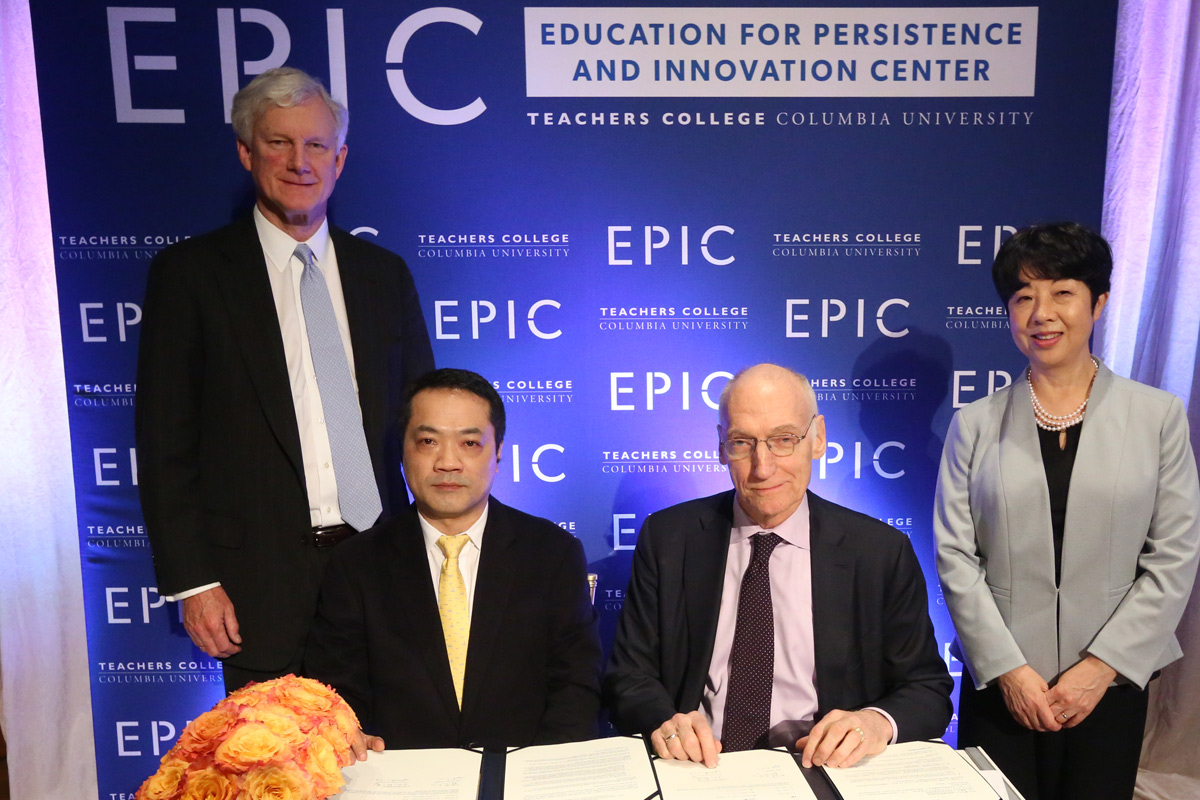Declaring that “failure is part of the process of discovering nature and the world around us,” Nobel Laureate Martin Chalfie today delivered the inaugural Yu Panglin Lecture of the Education for Persistence and Innovation Center (EPIC) at Teachers College.
Too many young people grow up with misapprehensions about scientists – “that they’re geniuses, that their experiments work all the time, that their hypotheses are right the first time, and then they just collect alots of prizes and honors,” said Chalfie, University Professor at Columbia University, who shared the 2008 Nobel Prize in Chemistry for producing a biological marker for gene expression that has since sparked a revolution in biological, medical and pharmaceutical research. But instead, he said, science is a long process of trial and error, with many important intermediary contributions before the final payoff. “Yet, as Mark Twain said, ‘It takes a thousand men to invent a telegraph, or a steam engine, or a phonograph, or a photograph, or a telephone or any other important thing—and the last man gets the credit and we forget the others.’”
Failure is part of the process of discovering nature and the world around us.”
—Martin Chalfie
EPIC is an interdisciplinary research and development center that studies failure across a wide variety of disciplines and tests theories about its use as a catalyst for innovation and success.
EPIC 2019: Martin Chalfie

AT C LEVEL Chalfie shared his undergraduate grades in chemistry, which nearly convinced him to quit science.
Directly preceding the lecture, which was delivered in TC’s Milbank Chapel, Teachers College President Thomas Bailey and Dennis Pang, Chairman of the China-based Yu Panglin Charitable Trust signed an agreement that expanded the scope of the Trust’s partnership with EPIC to include the new lecture series. After the lecture, Chalfie engaged in one-on-one discussion with Maiken Scott, host and creative director of the weekly health and science show The Pulse on WHYY, the National Public Radio affiliate in Philadelphia. Scott also asked questions posed by the audience.
EPIC 2019: Martin Chalfie & Journalist

DIALOGUING ON FAILURE Chalfie fielded questions from Meiken Scott, an NPR-affiliate radio host in Philadelphia.
Yu Panglin, who overcame poverty and China’s Cultural Revolution to become one of the world’s leading real estate developers, donated his entire $10 billion fortune to charity prior to his death in 2015. The Yu Panglin Charitable Trust has supported work in medicine, education and disaster relief, restoring vision for hundreds of thousands of cataract patients, funding the recoveries of towns and cities throughout China, and enabling thousands of Chinese students to realize educational opportunities. Teachers College is the first institution or organization outside of China to receive funding from the Yu Panglin Charitable Trust, and TC is the believed to be the first American higher education institution to name a lecture series after a person from Asia.
Yu Panglin was an extraordinary man – not only for the heroic manner in which he overcame terrible adversity and hardship but also for his generosity and love that knew no bounds.”
— Dennis Pang
“Yu Panglin was an extraordinary man – not only for the heroic manner in which he overcame terrible adversity and hardship but also for his generosity and love that knew no bounds,” said Dennis Pang, grandson of Yu Panglin and Chairman of the Yu Panglin Charitable Trust. “And as a lifelong learner who cherished education and revered the profession of teacher, my grandfather would also be so proud to see his foundation make its first gift outside of China to one institution in the world that is most synonymous with excellence in teaching and learning.”
The agreement signed by Bailey and Pang completed a process begun in China in October 2018, when the Yu Panglin Charitable Trust announced a $3 million gift to support EPIC’s research and community outreach efforts.
“We are so fortunate that a gift from the Yu Panglin Charitable Trust is supporting our research and outreach so that it can have a global impact on modern educational theory and practice,” said by Xiaodong Lin-Siegler, Director of EPIC and Professor of Cognitive Studies at Teachers College, in her opening remarks at today’s ceremony. “We have created this Yu Panglin Lecture to bring to light the stories of people who have experienced and overcome failure.”
Lin-Siegler’s groundbreaking 2016 study, published by the American Psychological Association and funded by a large research grant from the National Science Foundation, found that high-school students may improve their science grades by learning about the personal struggles and failed experiments of great scientists such as Albert Einstein and Marie Curie.
The partnership between EPIC and the Yu Panglin Charitable Trust “demonstrates what is possible when knowledgeable, caring and committed people come together to develop innovative, comprehensive solutions to the great challenges we face,” said Thomas Bailey, Teachers College’s President. “In this instance, the challenge we face is the pervasive view that failure is a sign of weakness, inadequacy, ineptitude and incompetence. But as Yu Panglin knew from his own experience, failure is not destiny. He knew that struggling with failure and adversity is essential to success.”
Yu Panglin knew from his own experience, failure is not destiny. He knew that struggling with failure and adversity is essential to success.”
— Thomas Bailey
In a talk he titled “Failed and Useless,” Chalfie elaborated on that same idea, beginning by sharing his undergraduate chemistry grades at Harvard, none of which were higher than a C. He spent a miserable summer working in a lab, afraid to ask questions, contemplated quitting science entirely, and worked as a janitor, sold dresses for his parents’ business and arranged rock concerts for a nonprofit before finally getting a job in the lab of ophthalmology researcher who studied frogs.
Chalfie concluded his remarks with a call to build a pipeline of young people who do basic research. Contrary to the stereotype, he said, all basic researchers think about their work will benefit the world. But ultimately, he added, "Success is not getting a Nobel Prize or wining the Olympics. Success is how we treat other people in our lives. Our families are our successes."
